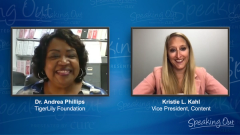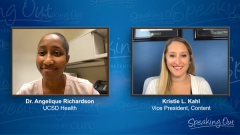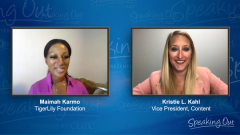
Educating Patients With Breast Cancer on Aspects Outside of Treatment
CURE spoke with Maimah Karmo, founder and CEO of the Tigerlily Foundation, about aspects outside of breast cancer treatment, like financial toxicity, psychosocial effects and more.
Kristie L. Kahl: How can a breast cancer diagnosis affect someone just psychologically?
Maimah Karmo: Well, I always equated to. So imagine you want to you're going on a trip, and you pick your location out and you want to get to this beautiful place in Greece, and you have your map and you pack your clothes, and you're on the plane, you're, you know, you're on the way there and you're excited. And then at some point, the plane lands, and you realize you're not in Greece, or in Paris. And whatever they're speaking, you can understand the language. It's a foreign land, the maps not in your language either. And then you look around you and there's like tigers and bears and lions, and you're like, what is happening right now? Because you're literally like, you're, you know, living your life going on this journey of life. And you have a plan, right? And you're happy to be on this plan. Like when I was diagnosed, I was, um, just got my first home and I had my dream job at the time. I was like, Yes, I got that car, I got the job, I have my little Blackberry, all that good stuff, right. And then I get the diagnosis. And I land, my planes gets rerouted someplace, I didn't plan to go. And I get out off the plane, I'm in a different country that didn't speak the language. And then there's all these things coming out me like diagnosis, what is the different words terminology, different treatment options, I had no idea how to decide on I mean, you're told to make these choices that will affect your life. And it's very scary. Um, and, you know, when you think about cancer, generally think about people who are older, not people in their 30s or 20s. And so I was unprepared for what I was meant, what I was there what I was now on. But I feel like I'm Oh, my mom did for me as a young child was really powerful. To me that the importance of self advocacy and knowing my body, when to speak up, or what to ask for was really, really critical as it changed my breast cancer trajectory. I knew to pursue diagnosis, so I got the right answer. I knew that kind of breast cancer has aggressive breast cancer, and then had to not only have treatment, but also really changed my life around to think about what I ate, getting rest, like how do I change my lifestyle? Would to body pounds compromised? immune this immune wise, right. So I think considerations are beside besides treatment is, you know, looking at your life in terms of like, you know, what can you control in your life? What can you manage that is your own. For me, it's my mindset. It's making goals of ways to make them all a better place for other people, is beginning a charity that can help others not go through what I go through, what I went through and not have that same kind of anguish, is working with partners to change patient outcomes through being innovative treatments and trials, right? It's having patients be able to call me in and talk to me about where they are, and help them to debrief right? to just come down. Even people who aren't cancer patient breast cancer patients call me I've one of my cousin's Call Today she is 22 when she has lymphoma and she's beautiful and she's so young, but she can she can ask me about fitting her port in chicken asked me about losing her hair, she can ask me about, you know, about anxiety and about thing about how children you know, at some point in her life, and you know, so even though it was a tough thing to go through for myself, being able to help people get through this process for me is the gift that I can give them give to others as they're going through their own journey as well.
Kristie L. Kahl: Are there resources available for patients to maybe help combat some of these psychosocial issues that they might experience after their diagnosis?
Maimah Karmo: Yep, I mentioned we did we do our pure cat classes so there's a lot of interaction where people who are home can log on and get training support get a personal trainer in their in their living room. You know our guest do yoga or Zumba dancing or do I sound bath I love the sound bath classes. They're very soothing I would often put them on and go to bed just fall asleep with restore relax things like sound bowls that help you to just to kind of dissenters music, it's just like, relax and have a forget about cancer for a moment. So that's I love the pure cat glasses. I'm also love. I'm a very spiritual. So we have a 24/7 prayer line. You can call the prayer line anytime anyone you call a patient caregiver or a child and someone will pray for you pray with you and hold a space for you where you are in the right your prayers down on paper. And then people take into our own hands have prayed over for like another month or two. So imagine that you know someone's prayed with space You and your concerns and your words on paper, and put it in a big basket with people praying for other people that you're not alone throughout that, you know, that journey is so powerful. We also offer a lot of peer support, we have a lot of patients that you know, don't know what to do to talk to you. So we do a lot of peer matching as well. And also, we work to ensure that people that wherever the patient is in their journey, whether it's just hearing the words that have breast cancer, and what do they need, you know, maybe like that peer support that help box, the journal that tells them how to get through that journey. And the journal takes them from breast cancer all the way through survivorship. If they need their bills pay, we have people that can do that for them. If they're having mental health support, mental health needs, or they're depressed or scared, we have the coaching or the Yeah, the care coaching or therapy, if they want to, you know, like for me, I used to help me through my journey was to be using my voice, if they want to be an advocate and speak up, we put them on panels, or sent to conferences. So whatever the patient needs, we help them navigate that journey. And we're always asking what they need, right? Because we were we were created by myself a patient from being a bit looking at where I was then all the way through where I am now. So we're always asking our patients, what do you need? What did you not get that you want, and then building programs around it. So like, we're kind of like the innovator in many ways of looking at, again, the gaps, I never want to be where we get static with our patients’ needs, because they're always changing. So beginning to end, we offer all these programs. And again, we're going to always keep evolving, because people are always getting going to have different needs, right? And, you know, we'll look at how we can help them and how we can support them, you know, before cancer during their breast cancer journey. And then of course, you know, once cancer is over.
Kristie L. Kahl: Can you discuss financial toxicity? And in particular, how does it affect patients with breast cancer?
Maimah Karmo: So a lot of patients, many people aren't prepared for cancer, and you saw it, even breast cancer, of course. So you're not prepared for the financial aspects of cancer, you know, having millions of people don't have insurance because our younger patients in college, right. Or if you're working hourly wage job and things like you know, kids in daycare or leaving your job often for treatment, you may not be able to have the gas to travel back and forth to scans and you know, on a regular basis. So those could be real challenges for people thinking about, do I take care of my family and my home? Or do I take care of myself and get treatment. And so one of the things you have to do within our organization is to really give people that support during that journey on paying their bills people write to us patients do we cover their bills anywhere from you know, rent slash mortgage to for meals or for prescriptions or co-payments, because we don't want someone to ever die because they couldn't afford to pay a bill or get insurance and we help people navigate those as well. We have partners we love to work with, like triage cancer, will help patients protect their rights within the workspace and deal with insurance needs as well. And so we always, you know, we help the patient within our org, we also asked our partners, what they're doing to be able to offer our patients extra support that we don't give directly through Tigerlily. And so we cast a wide net, within advocacy. And we really spend a lot of our time listening to our patients asking questions, and really going out there and seeing what can we offer our patients directly and whatever we can figure out how to give them that support through partnerships as well.
Kristie L. Kahl: What would you say is your biggest piece of advice in one for someone diagnosed with breast cancer, especially when it comes to some of those aspects outside of treatment that we just talked about?
Maimah Karmo: A breast cancer diagnosis can be very scary, but also for me, I tell people that life's unpredictable, right? Whether it's breast cancer or not. So don't let that diagnosis stop you don't let it Don't let it take you off your path. Make it take you on a new path. But don't let it get you off track right from where you're going. It's important to first of all, I would say you know, know what your rights are, know what your plan is that you're going to use for attack for the disease. That's the first thing know what your plan is be educated on that plan. Build a good health care team to help you through that journey. Build a good support team at home with your family and friends. Build a good team for your mental health and your emotional and spiritual needs as well. And build a plan for your life. You know, my family laughed at me because when I got diagnosed, I had a big party. And they're like, what are you partying about? And I was scared, but I thought you know what this is showing me that I can't take my life for granted. I can't just sit here and say well, I'm going to be I'll be 32 next year I'm going to buy another buy a house. I'm going to travel to Italy next year. I'm going to go here when this happens I'm wait for this to happen to do the next thing. What cancer taught me is that life cannot wait that my goals and dreams cannot Wait, and that it's important to figure out how to live a life that you want on your own terms that anything's possible. And for me, my dream was to really to really figure out how to ensure that people didn't go through what I went through, like being told that cancer having to push for six months diagnosed and then finding out it was aggressive. And then if I hadn't known what to do, I may not be here today. So I really think it's important to figure out your why when you're going through that journey. Because, for me, cancer awakened me into my purpose. And for those who are going through this, again, it is something that's really challenging, but ask yourself the question, like, how can I use this challenge as a catalyst for something that's bigger, better, bolder, and that can really help others through their breast cancer journey throughout their lives.






